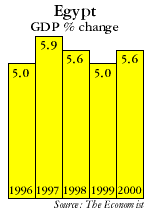 |
| Vol. 2 No. 1 | January 2000 |
Egypt enters the twenty-first century with the highest economic growth of any Middle Eastern country. According to numerous reports on the state of Egypt's economy, this growth is expected to continue and even improve so long as much-needed structural reforms remain high on the government's agenda.
 |
The best news to hit Cairo this month was the announcement by Egyptian Petroleum Minister Sameh Fahmi that new oil and natural gas resources have been discovered off the coast of the Mediterranean sea that will "meet Egypt's crude oil needs for the next 25 years, and natural gas needs for the next century." Production from the new field is expected to begin around 2001-2002. Estimates of Egypt's oil reserves have grown from 3.7 billion barrels to 8.2 billion barrels, while its gas reserves have increased from 36.5 trillion cubic ft to 120 trillion cubic ft.1 Egypt now has the third largest reserves of natural gas in the Arab world, after Qatar and Saudi Arabia.
According to the 1999 UNCTAD World Investment Report (WIR), Egypt is the second largest recipient of foreign direct investment in the Arab world, after Saudi Arabia. This has sparked tremendous growth in many sectors of the economy, including chemicals, construction, engineering, food, metal, and textiles. The International Finance Corporation (IFC) now ranks the Egyptian stock market sixth among thirty-four emerging markets in terms of revenue.
In addition, new government policies to promote exports and a rise in remittances from Egyptians working abroad are expected to bring Egypt an unprecedented flow of hard currency in coming years. Egyptian exports have risen considerably in recent years. One of the most successful export sectors is Egypt's burgeoning pharmaceutical industry, which has become the largest in the Middle East and North Africa, accounting for 20% of the regional market.2 The future of Egyptian exports may lie not in the Middle East market, but in Africa, where sustainable economic development is likely to create considerable demand for Egyptian products and permit improved economies of scale in Egyptian industry. Cairo's decision last year to join the Common Market of Eastern and Southern African Countries (COMESA) has already paid off handsomely--exports to other COMESA members doubled in the first half of 1999 and are expected to rise even further.
In order for Egypt to sustain and accelorate its economic progress, however, additional structural reforms will be needed. Bureaucratic barriers to trade and investment are still an impediment to further growth. Another potentially debilitating problem is Egypt's growing foreign debt, which now stands at $30 billion, representing 52% of the country's GDP and necessitating annual interest payments constituting 9.5% of its GDP.3 Domestic critics of the Egyptian regime have charged that it has rushed to pour money into a number of ambitious projects without careful evaluation of their viability, such as the Toshka irrigation project in the southwest, the East Port Said and Al-Sokhna ports, and iron ore mining and steel development facilities in Aswan.
1 Al-Ahram Weekly, 6 - 12 January 2000.
2 Emerging Markets Datafile, Business Today, 1 January 2000
3 Al-Arabi, 7 Jan 2000.